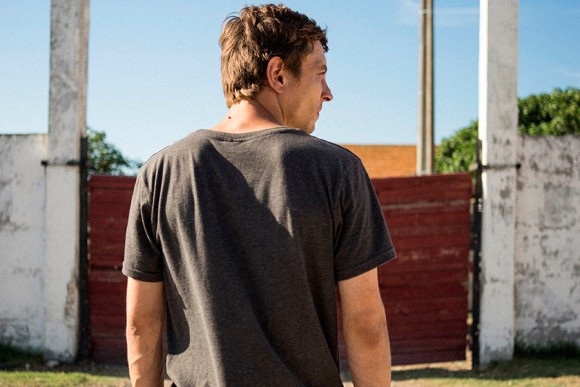Using its title as metaphoric key in a style reminiscent of Dogs, winner of the FIPRESCI award in the Un Certain Regard section at Cannes 2016, Toril sets up a comparison between the rules of the bullring and those of machismo – but thereafter, it devolves into a by now familiar Dardennes epigone.
Co-written by Teyssier and Guillaume Grosse, this is a typically cautionary tale set amidst sordid circumstances. It is told through the eyes of Philippe (Vincent Rottiers), a young factory worker cum marijuana grower living in southern France, who feels morally obliged to bring his family’s finances back into order after the suicide attempt of his father, Jean-Jacques (Bernard Blancan). A farmer facing expropriation by debt collectors and successive seasons of bad crops, Jean-Jacques refuses to sell his land or family property. Philippe strikes a deal with local drug lord José (Tim Seyfi) in order to make some quick money, so he stashes and distributes a large amount of hashish from his father’s marketplace shed. When a rival drug gang gets a hint of his operations, he finds himself and his loved ones in danger of getting horribly maimed at any moment.
Philippe is just another one in a long line of neurotic, money-driven protagonists of social realist dramas – the motivation behind his actions is implicitly anti-capitalistic: he is disdainful of the humiliation that blue-collar workers like him and his father endure. What follows is obviously a line of work outside of the system which supplies its most wealthy – and for Toril, the black market of choice is the world of drug paraphernalia. (In other films it’s illegally bred dogs, such as in Laurent Larivière’s Je suis un soldat. Pick your poison, I guess.)
But while these films may try to act as an exposé of the hardships of marginalized people, their tightly compact narratives, hell-bent on subjecting their characters to as much pain as possible, are a bit one-dimensional. The proletariat-protagonists find some way to topple the mini-systems in which they end up, but the sweet ending still is made bitter by another fine-print rule of capitalism. “Yes, this is not Mexico, but it’s the same world that we are living in,” José quips as Philippe expresses his disbelief at the gruesome things he’s seen, underlining the film’s entire ethos in one fell swipe.
The film does have its rare moments of cinematic poetry – as Philippe seals his agreement with José, their discussion is intercut with scenes of a bull being caught and branded with iron by the drug lord’s lackeys. But contrasted with the regular grittiness of the characters’ lives, such moments strike a rather dissonant, inconsequent chord. These sorts of inconsistencies are also visible in Toril’s cinematography – while the majority of the film is shot using an observational, hand-held aesthetic, the odd drone shot or slow-motion sequence intrudes occasionally with virtually arbitrary grandeur.
Toril is yet another film which uses certain visual and narrative tropes which only dilute their discourse into something palatable and ideologically one-sided. With such mechanisms employed over and over again, an image of a glum character struggling with poverty becomes as touching and banal as that of a couple kissing atop the Eiffel tower. And isn’t it ironic for such a subject to have become a commodity?




















